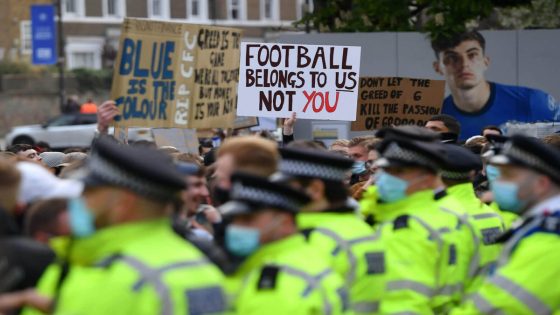The Premier League has asked its clubs to send a template letter to their local MPs as part of a lobbying effort to dramatically limit the powers of the proposed independent football regulator.
The letter, which The Athletic has seen, starts by explaining that England’s top flight is followed by 1.5billion fans in 189 countries, generates £8billion a year for the UK economy and supports almost 100,000 jobs.
According to the league, this “global success story” is threatened by “aspects” of the Football Governance Bill that is currently working its way through the Houses of Parliament.
While the league backs the bill’s measures on giving fans a bigger voice at their clubs, providing better protection for club heritage, such as badges, names and stadiums, and stopping breakaway leagues, it is strongly opposed to almost everything else.
“At the heart of our concerns lies a fundamental tension,” the letter says. “The proposed regulator, in its pursuit of safety and stability, may also damage our competition.
“It could dampen the sporting ambition and calculated risk-taking that underpins the Premier League’s unique competitive balance.”
Citing the fact that 51 clubs have appeared in the division since it broke away from the English Football League in 1992, the Premier League says bill’s “current construction presents two principal risks”.
The first is that by imposing “overly rigid financial controls”, the regulator will handicap “well-run” clubs that want to break into the established elite, thereby creating a “closed shop” that will undermine the league’s appeal.
The second is that the regulator’s proposed “backstop” power to force the Premier League to share more of its central broadcast and commercial income with the rest of the professional game is an “unprecedented intervention”, particularly if it “substantially reduces parachute payments”, the large but contentious sums of money the league gives to relegated clubs.
The league then goes on to note that “there is already a generous deal in place with the EFL (English Football League), which we will continue to honour”, that sees every Championship club receive at least £8million. Furthermore, it points out that the EFL has just negotiated new domestic and global broadcast deals worth £200million a season, which suggests the EFL’s “financial challenges” are more about “how resources are managed” than “insufficient funding”.
The letter then asks the MPs to consider three amendments to the bill that it believes will preserve the league’s “carefully calibrated ecosystem”.
One: make the backstop power a genuine last resort and agree that if a Premier League proposal on a funding issue meets the regulator’s objectives, it should be the default option, as it is the league’s money.
Two: keep parachute payments “as essential tools for competitive balance” and, if any changes are made to their amounts, to phase them in over three years.
And three: focus regulation only where it is needed to avoid burdening good clubs with red tape or duplicating the game’s current efforts to ensure financial sustainability.
This letter was distributed to clubs on Monday and then discussed in a conference call with the league’s chief policy and corporate affairs officer Clare Sumner.
Calls for independent regulation of the national game go back to the 1990s but all three of the main national parties in the UK decided to back the idea in 2021, when a series of crises led to a review of English football’s governance by former sports minister Tracey Crouch.
Following more than two years of consultation, the former Conservative government introduced a bill to bring in a regulator in March but ran out of parliamentary time to make it law. The new Labour government, however, introduced a slightly beefed-up version of the bill last month.
The Premier League has been trying to block, delay and handicap the regulator for three years without much success.
The EFL, on the other hand, strongly backs the idea of a regulator who can intervene to ensure a fairer distribution of the English game’s accumulated wealth. It also points out that the vast majority of the money the Premier League sends to the EFL is shared between a handful of relegated clubs who then enjoy a significant head start over the rest of the Championship, forcing the rest of the clubs to overspend if they wish to compete.
The Premier League has been contacted for comment.
(Mike Hewitt/Getty Images)





